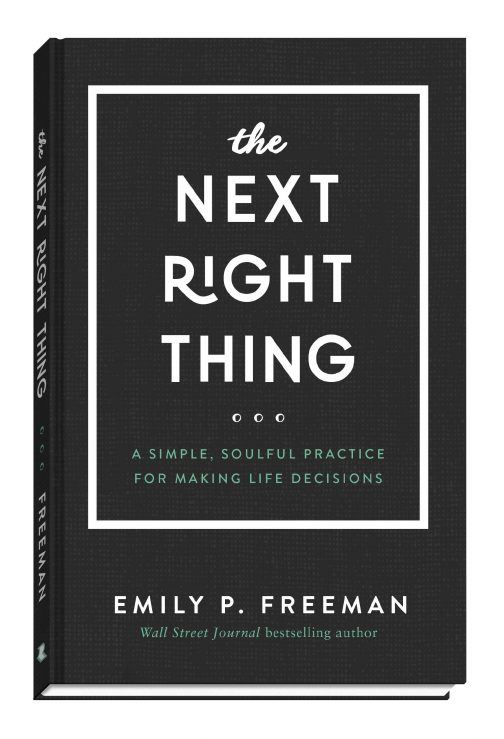
From Chapter 1 of The Next Right Thing
When it comes to making decisions, chances are you’ve probably heard the advice this book is built upon before. The phrase isn’t new or even particularly creative. Personally, it’s advice I’ve taken, forgotten, and remembered again. But it’s held me up through young motherhood, grief, indecision, frustration, vocational boredom, and spiritual confusion. A version of this advice has been famously quoted by Mother Teresa, Reverend Martin Luther King Jr., Theodore Roosevelt, and Anne Lamott. It’s become a common catchphrase for coaches and athletes, in boardrooms and corporate motivational speeches. So, what is that advice? Do the next right thing.
The Weight of Unmade Decisions
The concept is perhaps most famously found in The Big Book of Alcoholics Anonymous: “We earnestly pray for the right ideal, for guidance in each questionable situation, for sanity, and for the strength to do the right thing.”
While we may not all be alcoholics, it’s safe to say we all need guidance in each questionable situation, we all need the strength to do the right thing, and, in many ways, we are all addicted to something. There’s nothing like an unmade decision to smoke our addictions out.
Maybe you are addicted to clarity and certitude, wanting to be absolutely sure of all the details before moving forward.
Maybe you value approval above all, wanting to seek everyone else’s perspective before understanding your own, accounting for a lack of confidence and a chronic case of hesitation.
Maybe you have an aversion to making decisions so you either delegate them, avoid them, or make them too quickly just to get them settled.
Perhaps you’re addicted to activity, to hustle, to the fast pace of a well-connected life, and so when a decision needs to be made that could change the course of your future, you don’t have the space to consider what might be best, much less what you might actually want to do.
Taking Our Cues from Jesus
It’s estimated that adults make over 35,000 decisions every day. A study at Cornell University revealed that Americans make over two hundred daily decisions on food alone.2 So many of those decisions are mindless; we aren’t actually aware of our choices. Right now chances are high that you have a decision to make. Those 35,000 decisions don’t even account for the extra ones that come in the midst of a job loss, marriage proposal, graduation, diagnosis, cross-country move, promotion, argument, pregnancy, or car accident. Every day we have choices to make, priorities to set, goals to meet, and desires to consider.
Doing the next right thing is good advice, but it didn’t sink in for me fully until I started noticing it in the Gospels. So often, right after Jesus performed a miracle, he gave a simple next thing to do.
To the leper, he said to tell no one, “But go and show yourself to the priest” (Luke 5:14).
To the paralytic, he said, “Get up, pick up your stretcher, and go home” (v. 24).
To Jairus and his wife, after raising their daughter from the dead, when he had their full and complete attention, and when chances were good he could get them to swear their lives away for his sake, he did not perform a lecture about dedicating their lives to him or about what grand plans he had for their girl now that she was alive. Instead, he told them to give her something to eat (8:55). After raising their daughter from the actual dead, the one thing Jesus told them in the face of their rapt attention was to go make lunch. At first glance, that seems like a waste of a captive audience.
Rather than a life plan, a clear vision, or a five-year list of goals, the leper, the paralytic, and Jairus and his wife were given clear instructions by Jesus about what to do next—and only next. Perhaps he knew something about our addiction to clarity. He knew if we could somehow wrangle a five-year plan out of him, we would take it and be on our merry way.
After Jesus performed miracles, he made the next right thing unmistakably clear. But what about for us? Let’s take our cues from Jesus and the recovering alcoholics by considering what it means for us to do the next right thing now. Not the next big thing. Not the next impressive thing. Just the next right thing in front of us. So what is our next right thing? It’s a question that gets my attention, and it’s what I want to explore with you.
Becoming More Fully Yourself
This is a book about making decisions. It's also a book about making a life. What a privilege it is to have a choice to make at all. We live in a world where many people don’t have the luxury of choice in certain areas, and this book presupposes you are in a position in life where choices are yours to make. We all have a different degree of control over various areas of our lives, depending on our age, our season, our family life, and our degree of privilege because of our race, gender, financial situation—and so on forever. I’ll invite you as you read to bring to mind those areas in your life where you do have a choice, no matter how small. Be willing to hold your choices with an open hand and see them from a different perspective.
Regardless of your own degree of personal choice, you have a God who walks and talks with you, who moves in and through you, who sings over you. How he moves in you may be different from how he moves in me, but one thing is certain. He remains unchanged. As my friend and teacher James Bryan Smith so kindly reminds us, you are one in whom Christ delights and dwells, and you live in the strong and unshakable kingdom of God. The decision is rarely the point. The point is you becoming more fully yourself in the presence of God.

Excerpted from The Next Right Thing by Emily P. Freeman, Copyright © 2019 by Emily P. Freeman. Published by Revell, a division of Baker Publishing Group. All rights reserved.
Emily P. Freeman is the author of the national bestsellers The Next Right Thing, Simply Tuesday and A Million Little Ways. As host of The Next Right Thing podcast, she helps create space for the soul to breathe, offering fresh perspective on the sacredness of our inner life with God. Emily and her husband live in North Carolina with their three children. Connect with her online at www.emilypfreeman.com and on Instagram @emilypfreeman.
Photo Credit: Unpslash


